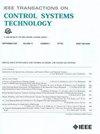基于混合建模的鲁棒逆前馈控制
IF 3.9
2区 计算机科学
Q1 AUTOMATION & CONTROL SYSTEMS
引用次数: 0
摘要
本文提出了一种鲁棒前馈设计方法,使用混合建模来提高进给驱动器的输出跟踪性能。针对前馈设计的使用,混合模型以平面解析模型表示主导线性动力学,并通过高斯过程(GP)回归捕获输出非线性。前馈控制是基于模型反演的,设计过程是一个基于信号的鲁棒控制问题,考虑了不确定情况下的跟踪、抗干扰和减少输入等多个性能目标。此外,采用结构化$\mu $合成技术,可对固定结构前馈增益进行直接鲁棒调谐,保证了其在工业硬件中的适用性。提出的方法方法涵盖了从建模到控制体系结构选择和权重设计的整个过程,提供了考虑性能和健壮性需求的端到端策略。在具有实时性的工业铣床上进行了验证,与工业标准基线前馈和标称设计相比,所提出的鲁棒控制器在瞬态阶段的平均绝对跟踪误差分别降低了83%和63%。即使在模型参数变化20%的情况下,鲁棒前馈仍然可以在最坏情况下相对于基线减少58%的误差。本文章由计算机程序翻译,如有差异,请以英文原文为准。
Robust Inversion-Based Feedforward Control With Hybrid Modeling for Feed Drives
This article presents a robust feedforward design approach using hybrid modeling to improve the output tracking performance of feed drives. Geared toward the use for feedforward design, the hybrid model represents the dominant linear dynamics with a flat analytical model and captures the output nonlinearity by Gaussian process (GP) regression. The feedforward control is based on the model inversion, and the design procedure is formulated as a signal-based robust control problem, considering multiple performance objectives of tracking, disturbance rejection, and input reduction under uncertainties. In addition, the technique of structured $\mu $ synthesis is applied, which allows direct robust tuning of the fixed-structure feedforward gains and ensures the applicability in industrial hardware. The proposed methodological approach covers the entire procedure from modeling to control architecture selection and weights design, delivering an end-to-end strategy that accounts for performance and robustness requirements. Validated on an industrial milling machine with real-time capability, the proposed robust controller reduces the mean absolute tracking error in the transient phase by 83% and 63% compared to the industrial standard baseline feedforward and the nominal design, respectively. Even with a variation of 20% in the model parameters, the robust feedforward still reduces the error by 58% in the worst case with respect to the baseline.
求助全文
通过发布文献求助,成功后即可免费获取论文全文。
去求助
来源期刊

IEEE Transactions on Control Systems Technology
工程技术-工程:电子与电气
CiteScore
10.70
自引率
2.10%
发文量
218
审稿时长
6.7 months
期刊介绍:
The IEEE Transactions on Control Systems Technology publishes high quality technical papers on technological advances in control engineering. The word technology is from the Greek technologia. The modern meaning is a scientific method to achieve a practical purpose. Control Systems Technology includes all aspects of control engineering needed to implement practical control systems, from analysis and design, through simulation and hardware. A primary purpose of the IEEE Transactions on Control Systems Technology is to have an archival publication which will bridge the gap between theory and practice. Papers are published in the IEEE Transactions on Control System Technology which disclose significant new knowledge, exploratory developments, or practical applications in all aspects of technology needed to implement control systems, from analysis and design through simulation, and hardware.
 求助内容:
求助内容: 应助结果提醒方式:
应助结果提醒方式:


